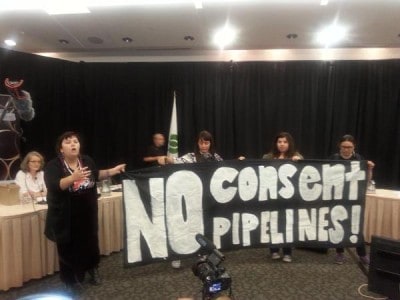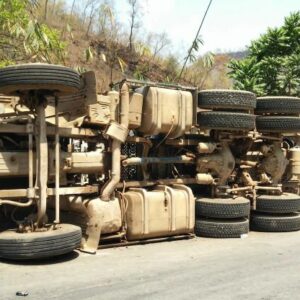 This week, women representing the First Nations shut down a pipeline meeting in Montreal. The meeting was on the controversial TransCanada Pipeline which could potentially displace tens of thousands of people and create untold environmental pollution. Native communities will be some of the most hard hit by the pipeline, as the oil companies are planning on building directly through their ancestral homelands, the land that was promised to them through very early government treaties.
This week, women representing the First Nations shut down a pipeline meeting in Montreal. The meeting was on the controversial TransCanada Pipeline which could potentially displace tens of thousands of people and create untold environmental pollution. Native communities will be some of the most hard hit by the pipeline, as the oil companies are planning on building directly through their ancestral homelands, the land that was promised to them through very early government treaties.
Amanda Lickers of the Seneca-Haudenosaunee community was one of the women who joined the protest. She told reporters on the scene that she was determined to protect her homeland and the environment surrounding it.
“What we want TransCanada to understand is that no means no. This is Kanien’ke, this is Mohawk Land, and we are tired of occupation, we are tired of environmental disaster. This is our land and we are going to protect it,” she said.
During the protest, four native women held a banner that said “No consent, no pipelines” as the meeting was being canceled.
#nopipelinesnoconsent #energyeast #pipeline consultantion disrupted @defendourlands #unistoten pic.twitter.com/AhVutlGghY
— stimulator (@stimulator) September 23, 2015
“The NEB doesn’t even make the call. All they do is put a recommendation to the federal government. We wanted to push home that this is a process of futility, and if we are going to stop pipelines, we need to move forward with direct action. We have a responsibility to future generations to assert our sovereignty,” Lickers told Common Dreams.
The police were called to the protest, but luckily no arrests were made.
Earlier this year, in Rosebud South Dakota, the Rosebud Sioux Tribal President made an official announcement, stating that the Rosebud Sioux Tribe considers the laying of the Keystone XL tar sands pipeline through their lands to be an “act of war.”
One of the most effective propaganda campaigns that the government has going for them is the idea that it is somehow their job to protect the environment.
This is said to be accomplished by punishing those who damage the environment. However, situations like this give a much clearer view of reality.
In this case and in most others, individual private property holders are actually personally invested in the land, thus they have a greater incentive to actually take care of the property and be conscious of the environment.
With the Tar Sands pipeline, we see how the government is actually taking property away from people who would treat it well and then selling it to people who will undoubtedly disrespect it.
Without the strong arm of the government to expropriate the property, the companies that are building this pipeline would be forced to directly negotiate with these property holders themselves or offer them fair deals in return for their property.
Beings that most of these people have so much personal history invested in this land, the majority of them would refuse to negotiate, making the construction of this pipeline completely impossible.
Sadly, politicians have no problem negotiating with other people’s property, so they can be lobbied to use the guns of government to expropriate land on behalf of a third party, making projects that no one wants in their “own back yard” a reality.
John Vibes writes for True Activist and is an author, researcher and investigative journalist who takes a special interest in the counter culture and the drug war.
This article ( Women Of The First Nations Shut Down Tar Sands Pipeline Hearing ) is free and open source. You have permission to republish this article under a Creative Commons license with attribution to the author and TrueActivist.com.


